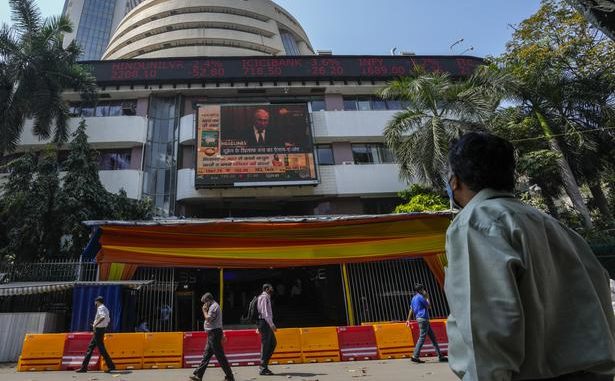
NewDelhi: The 30-share BSE Sensex rebounded in the afternoon session on Monday, but continued to stay in red, trading at 53,101.56 – down by 1,232.25 points or 2.27 per cent. Similarly, the NSE Nifty was trading at 15,912.55 – down by 332.80 points or 2.05 per cent – in the afternoon session amid escalating tensions between Russia and the West over the invasion of Ukraine.
Earlier, the Sensex plunged 1,686.08 points or 3.10 per cent in the opening session and trade at 52,775.58 while the Nifty opened at 15,797.75, declining by 447.60 points or 2.76 per cent.
On the Bombay Stock Exchange (BSE), the ICICI Bank was the top loser, shedding by 5.54 per cent, followed by Maruti Suzuki India, Bajaj Finance, Larsen and Toubro, Mahindra and Mahindra, Asian Paints, HDFC, Ultratech Cement, IndusInd Bank, Bajaj Finsv, Kotak Mahindra Bank, and Axis Bank. Tata Steel, meanwhile, was the only stock trading in green.
On the National Stock Exchange (NSE), Maruti Suzuki India was the top loser, falling by 5.59 per cent to Rs 6,842.35. Vodafone Idea, Ashok Leyland, Punjab National Bank (PNB), Bank of Baroda, YES Bank, Tata Motors, and Adani Power were also among the laggards.
Multiple factors could be blamed for stock market’s poor performance on Monday. Oil prices also jumped more than USD 10 a barrel on Monday after the United States (US) and its European allies explored a Russian oil import ban, while delays in the potential return of Iranian crude to global markets sped up supply fears. It should be noted that India is the world’s third-largest importer of crude oil, and rising prices push up the country’s trade and current account deficit while also hurting the rupee and fuelling imported inflation.
Dr VK Vijayakumar, Chief Investment Strategist at Geojit Financial Services, has warned that Indian investors need to be cautious as the country’s growth will be lower and inflation higher than projected for the financial year 2023.
“The extraordinary uncertainty triggered by the war has pushed commodity markets into turmoil. Crude at USD 139 is a big shock. This can impact global growth and aggravate inflationary pressures,” he said, as reported by The Economic Times. “There is relative safety in energy due to high energy prices, metals due to high global prices and export segments due to resilient demand and rupee depreciation.”
Bureau Report
Leave a Reply